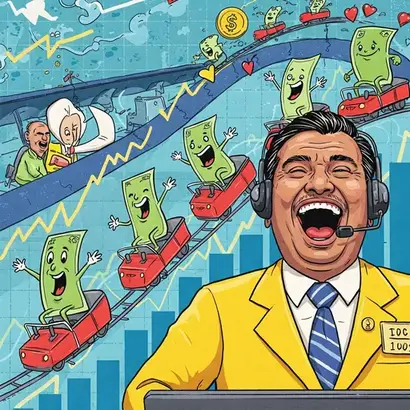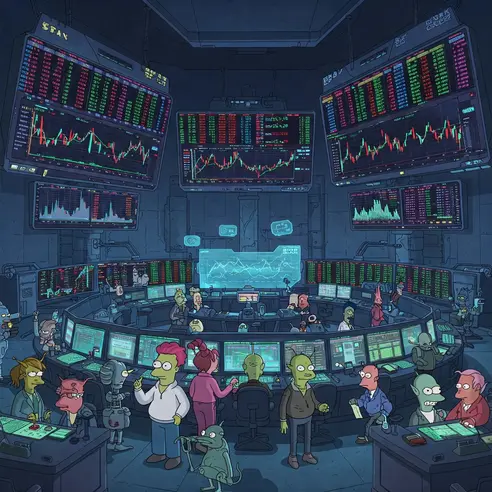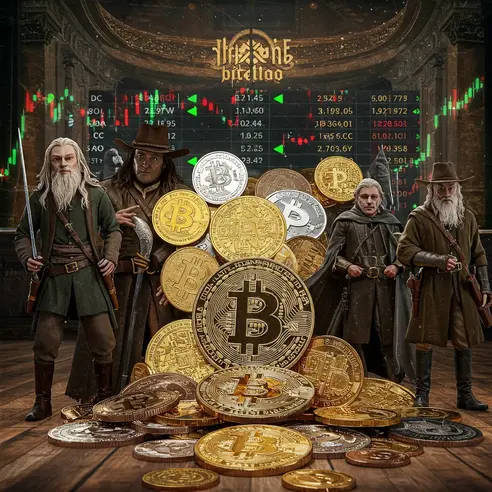April 3, 2025, marked a dark day for global financial markets. A shocking announcement from former U.S. President Donald Trump regarding the imposition of sweeping tariffs on imported goods sent major stock indices into a freefall. Investors and market participants were caught off guard, triggering panic selling and market instability.
🔄 Key Market Drops
Following the announcement of a 10% universal tariff on all imported goods—alongside additional “reciprocal” tariffs on China (54%), the European Union (20%), and Japan (24%)—U.S. stock markets reacted with sharp declines:

| Index | Drop (Points) | Percentage Decline |
|---|---|---|
| Dow Jones | -1,585 | -3.8% |
| S&P 500 | -142 | -3.4% |
| Nasdaq Composite | -685 | -4.5% |
📈 The Hardest-Hit Stocks
Companies with supply chains dependent on Asian imports bore the brunt of the decline. Among the biggest losers:
- Apple: ⬇️ -7.5%
- Tesla: ⬇️ -6.1%
- Amazon: ⬇️ -7.3%
- Nvidia: ⬇️ -5.9%
🌐 Real Story: A Day Trader’s Nightmare
Mark Stevens, an independent day trader, shared his experience of the crash: “I was monitoring my portfolio when the news hit. Within minutes, my positions in tech stocks plummeted. I lost nearly $30,000 in an hour! This kind of volatility is why traders need to be prepared for anything.”
🔄 Economic Consequences
💧 Rising Inflation Concerns
As import costs surge, consumers are expected to face higher prices. Economists predict inflation could rise by an additional 1.5% over the next quarter, directly impacting household budgets.
🌿 Growth Stagnation
Trade wars have historically slowed economic growth. Analysts warn that global GDP may contract by 0.8% if retaliatory tariffs escalate.
🏛️ Corporate Struggles
Businesses relying on imported components will face:
- Higher production costs
- Reduced profit margins
- Potential layoffs in manufacturing sectors
🌍 Global Reactions
World leaders have condemned the tariffs, with China and the EU signaling retaliatory measures:
- European Union: Considering a 25% tariff on U.S. automobiles.
- China: Planning to impose higher tariffs on U.S. agricultural products.
🚀 Strategies for Investors
📅 Safe-Haven Assets
During market turmoil, investors seek stable options:
- Gold 💰: Prices have surged by 8% since the announcement.
- U.S. Treasury Bonds: Increased demand is pushing yields lower.
- Dividend Stocks: Stable companies like Coca-Cola and Johnson & Johnson saw minor fluctuations.
🎈 Expert Tips
- Stay Diversified: Avoid putting all your investments into volatile sectors.
- Use Stop-Loss Orders: Set predefined exit points to limit potential losses.
- Monitor Market Trends: Stay updated on geopolitical risks that affect the stock market.

The April 2025 market crash serves as a wake-up call for traders and investors. Whether this downturn is a temporary panic or the beginning of a deeper financial crisis remains to be seen.
📘 What’s Next? Will governments negotiate a resolution, or are we entering a prolonged trade war? Investors should remain vigilant and adapt to the evolving economic landscape.
Stories of Success and Failure: Lessons from Great Entrepreneurs
Business is not just about money—it’s about risks, courage, and learning from mistakes. The world’s most successful entrepreneurs have faced setbacks and triumphs before reaching the top. Today, we’ll explore fascinating stories of failures and victories that inspire and educate.
📉 A Failure That Led to Success: Howard Schultz and Starbucks
☕ The Starbucks story could have ended before it even began.
In the 1980s, Howard Schultz, the future CEO of Starbucks, proposed a radical idea: transforming the company into an Italian-style coffeehouse chain. The owners rejected his vision. But instead of giving up, Schultz launched his own coffee brand, Il Giornale. A few years later, he acquired Starbucks and turned it into a global powerhouse.
🎯 Lesson: Sometimes rejection isn’t the end—it’s the start of something even greater.
🏦 The Most Expensive Failure: WeWork
🏢 WeWork was poised to become the biggest name in co-working spaces—until it wasn’t.
Adam Neumann built WeWork on bold promises and charisma, attracting billions in investment. As the company prepared for an IPO in 2019, analysts uncovered its massive financial losses and Neumann’s reckless leadership. The IPO collapsed, WeWork’s value plummeted by 90%, and Neumann was forced to step down.
⚠️ Lesson: Even the most promising startups can fail without strong management and financial discipline.
🏗️ From Bankruptcy to Billions: Henry Ford’s Early Struggles
🚗 Before Ford became an automotive giant, Henry Ford failed—twice.
His first company, the Detroit Automobile Company, went bankrupt due to production issues and funding shortages. Rather than giving up, Ford learned from his mistakes and founded Ford Motor Company. His iconic Model T revolutionized the auto industry and made cars affordable for millions.
🔑 Lesson: Failure is just a stepping stone to success—if you learn from it.
🎮 Nintendo’s Surprising Transformation
🎮 Nintendo started as a playing card company in 1889!
When demand for cards declined, the company experimented with various industries, from taxis to instant noodles. However, its biggest breakthrough came when it entered the video game market. Today, Nintendo is one of the most recognizable brands worldwide.
💡 Lesson: Adaptability and willingness to change are key to long-term success.
The international stock market is a dynamic and ever-evolving financial ecosystem that connects investors, companies, and economies across the globe. 🌍📈 Whether you are an experienced investor or a beginner exploring global markets, understanding its intricacies can provide significant opportunities. This article delves into the key aspects of the global stock market, offering valuable insights, real-life examples, and smart investment strategies.

What is the Global Stock Market? 📊
The global stock market is a network of stock exchanges operating in various countries, facilitating the buying and selling of company shares. The largest stock exchanges include:
| Stock Exchange | Country | Market Capitalization (Trillions USD) |
|---|---|---|
| New York Stock Exchange (NYSE) | USA | $24.5 |
| Nasdaq | USA | $19.5 |
| Shanghai Stock Exchange | China | $8.2 |
| Euronext | Europe | $7.3 |
| Tokyo Stock Exchange | Japan | $6.8 |
Each of these markets operates under different regulations, offering diverse investment opportunities. 📌
Why Do Investors Go Global? 🌎
Investing in international markets offers several benefits:
✅ Diversification: Reduces risk by spreading investments across different economies. ✅ Higher Returns: Emerging markets often provide higher growth potential. ✅ Currency Advantage: Investors can benefit from favorable exchange rate fluctuations. ✅ Access to Innovation: Tech giants and industry leaders outside one’s home country offer unique opportunities.
📢 Real Example: Apple Inc. (AAPL) is listed on the NYSE, but many of its suppliers, like Taiwan Semiconductor Manufacturing Company (TSMC), trade on the Taiwan Stock Exchange. Investors who diversified globally reaped significant rewards from TSMC’s growth.
Key International Stock Market Trends in 2025 🔍
1. AI and Tech-Driven Stocks 🚀
Artificial intelligence and automation are reshaping industries. Companies like NVIDIA, Microsoft, and Tencent continue to dominate the tech space.
2. ESG (Environmental, Social, and Governance) Investments 🌱
Sustainable investing is gaining traction. European stock exchanges see a surge in ESG-focused funds.
3. Emerging Markets Boom 📈
Markets in India, Brazil, and Vietnam are attracting global investors due to their rapid economic growth.
4. Cryptocurrency Integration 🔗
Stock exchanges in Canada and Switzerland have begun listing crypto-based ETFs, merging traditional and digital finance.
Challenges and Risks of Global Investing ⚠️
Despite its advantages, investing in the international stock market comes with challenges:
🔺 Currency Risk: Fluctuations in exchange rates can impact returns. 🔺 Regulatory Differences: Each country has unique financial laws and restrictions. 🔺 Political Instability: Geopolitical events can lead to market volatility. 🔺 Liquidity Issues: Some international stocks may have lower trading volumes, making them harder to buy and sell quickly.
📌 Example: In 2022, the Chinese government’s regulatory crackdown on tech companies led to a sharp decline in Alibaba’s (BABA) stock, affecting global investors.
Smart Strategies for Global Investors 🧠💡
📍 1. Invest in ETFs and Index Funds
- ETFs like the Vanguard FTSE All-World ETF (VWRL) provide exposure to global markets with minimal risk.
📍 2. Stay Informed on Geopolitical Events
- Understanding how global events impact markets helps make informed decisions.
📍 3. Hedge Currency Risks
- Using currency-hedged ETFs or forex strategies can minimize losses from exchange rate fluctuations.
📍 4. Focus on Long-Term Growth
- Short-term market fluctuations are common; long-term investments yield better results.
📍 5. Use Reliable Trading Platforms
- Brokers like Interactive Brokers, Charles Schwab, and eToro offer access to multiple international markets.
Seize Global Investment Opportunities ✨
The international stock market presents incredible opportunities for those willing to explore beyond their local exchanges. By understanding global trends, managing risks, and applying smart investment strategies, investors can build a profitable and diversified portfolio. 🌍💰

